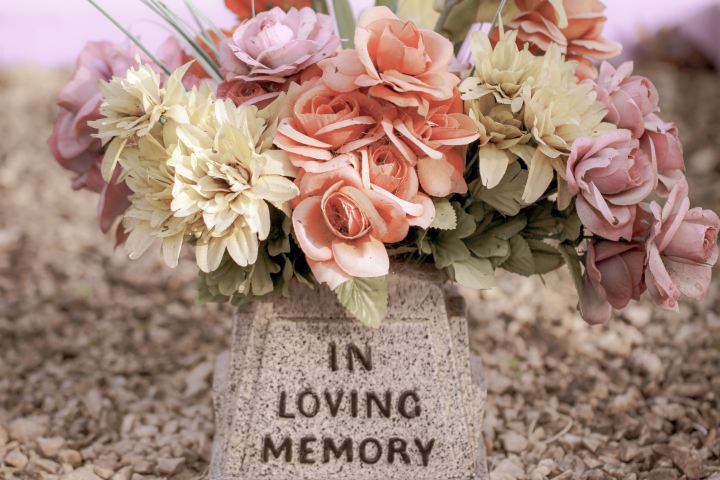WORDS AND TEARS OP-ED
The language of grief – what to say when someone dies

What do you say to someone experiencing loss, someone who can hardly hear you due to the all-encompassing numbness they might feel?
Words can seem inadequate when someone dies. It’s a delicate time, when expressions of love or compassion push forward to be uttered, but can sound worn or clumsy. They may be incapable of describing the enormity of loss, the sudden shocking change. Receiving them, the bereaved person may be struggling to come to terms with a new relationship with the world and themselves, without the person they loved, and who loved them.
Our words might not find them, in this state. The balance has tilted and shifted. It’s not something we have much practice with either, I suspect. For most of us, it’s not like we have many opportunities to extend our sympathies, or that we practice expressing condolence that often. We’re full of life, for the most part. That’s where the focus is. Death seems to move unseen, in the opposite direction.
Perhaps we too have lost people. Maybe a handful of precious folk, and then only later in life, when the prospect of our own mortality starts coming into focus. Or we are well acquainted with grief, from our early days already. Alternatively, death may have had very little to do with us, and some future grief waits like an unwelcome visitor, of indeterminate shape, at a faraway gate. This grief has a name. It’s called anticipatory grief.
So, what do you say to someone experiencing loss, someone who can hardly hear you due to the all-encompassing numbness they might feel? Grief affects people physiologically, emotionally, behaviourally, cognitively and spiritually – it is that all-encompassing. A dry mouth, loss of appetite, emotional numbness, indecision, mood swings, a preoccupation with the deceased, a loss of faith or its opposite – these are all possible symptoms of grief, among others. And as I’ve long believed, you can’t tell people things in this life, because they hear what they want to anyway. People in their grief seem even more preoccupied, more distant.
So I did a little survey recently after a friend shared the sad news of a family member’s death on social media. I pored over the comments, about 400 of them. Yes, she’s popular, and yes, it’s okay to share news of death this way too. About a quarter of the comments mentioned the word “sorry” – by far the most common word used. As in, “sorry for your loss”, or simply “so sorry”. Only two used the word “condolence” while a pile mentioned that they were “sending” something – most of it love, some of it strength. A fraction said that they were “holding you in our thoughts”. Or hearts.
My little experiment confirmed that in my circle at least, “sorry” is the go-to expression these days. Sorry for your loss. Effective and to the point. Need anything more be said? Saying sorry in this way is almost just a note, an acknowledgement that there is a void, and that trying to fill it with meaningful eulogising is a spurious undertaking. It’s pithy and direct and implies an understanding, and, importantly, gives space to the grieving recipient. “Sorry” doesn’t crowd in upon them. “Sorry” claims no spiritual high ground. There’s nothing objectionable about it. It’s perfectly appropriate, but improved by any free-to-use adjective, such as very, immensely, massively, etc.
The person who has died becomes a silent absence, even if their outline in our lives remains. They are both gone and not gone, having left ample traces in the world, and in other people.
What does sorry mean? In South Africa we tend to use the word a lot, so it may be denuded of some impact. Still, we do want to convey that we feel too, for our friend, and are affected, touched, sympathetic. “Sorry” describes the emotion of sorrow, and with it, we become part of this community of the bereaved, a community that the grieving person will rely on. So, by all means, say “sorry for your loss”. Join the community. Don’t say nothing.
My personal choice is “my sincere condolences”. Why? I like the word condolence because its use is specific to grief – not the grief of divorce or another life event (some grieve when they marry, too, for their former self), but grief in its original sense. Ultimately derived from the Latin condoleō (“I sympathise”), assembled from con– (“together, with”) and doleō (“I hurt, suffer, have pain”), according to the Collins English Dictionary. The intransitive verb “condole” – as in, “Hey, I can totally condole” – was popular in the mid 1700s. Now, not so much.
It’s related to dolorous, a beautiful word I feel we could use more frequently, literally meaning sorrow or pain. In Spanish, people say condolencias. In German, Beileid, meaning sympathy, Swedish beklaga sorgen, “regret the sadness”, in Dutch, innige deelneming, “heartfelt participation” (nice one Google!), while Afrikaners use meegevoel, “with feelings”, and isiZulu amazwi enduduzo, roughly “words of condolence”. An isiXhosa friend uses the phrase Tutwini. Akuhlanga lungehlanga. This translates, she says, as “what has happened has happened before”, that death has always been with us.
Last, when someone dies, even if it’s expected, it’s still a shock. The finality of death is something so foreign to the mindless continuity of daily life, an almost obscene betrayal of it. It allows for no second chances. The person who has died becomes a silent absence, even if their outline in our lives remains. They are both gone and not gone, having left ample traces in the world, and in other people. There’s a dual task at play, to both acknowledge that they were, and still are, in the love they leave in others. There is an almost schizophrenic process of letting go and holding on at the same time.
As Philippa Perry, advice columnist in the Guardian, writes: “When someone we are close to dies, we don’t only lose them, but we also lose the person we were when we were with them.” So there’s a deeper loss, a part of us that is also torn away with them. Behind the expression of sorrow for the more obvious loss is this other one. So when we do say “sorry for your loss”, we understand that here, some real empathy can flower. We realise the small cavern behind the waterfall of their grief, that special aspect of our friend or family member which feels like it has closed up, and might never be visited again. But the course of grief changes, over time, even if it never stops flowing, it will abate, and come to gently nourish different parts of us. We make meaning from it. DM
Sean O’Connor provides end-of-life care and produces the How to Die podcast, available at howtodie.co.za and on Spotify, Apple podcasts and elsewhere.



















 Become an Insider
Become an Insider
Thanks for this well-needed advice!
I have always struggled with making such responses and like to keep it simple and meaningful as you suggest.
I find ‘condolences’ a bit formal and distant.
I also like to ,send a warm embrace’
Hi Peter
Thanks for your comment. I agree, condolences is a little formal and distant. I’m a bit old fashioned and relish the opportunity to use any word that might itself die a quiet death…
A warm embrace is all we need.
Wishing you well,
Sean
Thank you for a useful article. However, I’m troubled by your use of the word ‘schizophrenic’ in the second-last paragraph. Someone used it incorrectly in the same way in my hearing last week when commenting on it would not have been appropriate. Since then, I’ve been reflecting on how triggering that was for me and why that was the case, which explains why I’m motivated to comment here today.
The answer is simple. I have a personal history with schizophrenia – my brother was schizophrenic – and I know the horrors of living with this severe mental illness only too well. When people use the word lightly, loosely or incorrectly, a part of me reacts.
I think the error arises because of the pervasive but incorrect belief that schizophrenia is another name for what used to be called ‘split personality’, and so people assume it’s an appropriate term for a situation in which two opposite states exist at the same time. In reality, schizophrenia is a mental disorder characterised by hallucinations and delusions.
Of course, I’m talking about something bigger than my own feelings here. For example, if I were to refer to myself as a ‘little OCD’ just because I pay attention to details, I would be (probably unwittingly) trivialising the experience of people who live with this debilitating condition.
I believe our choice of words matters. Why not wield them with sensitivity and awareness, especially when using words associated with mental illness, which already carries so much stigma?
Agreed. The use of the word schizophrenic irresponsibly always irks me.
Hi Marie
I’m grateful for your comment – thank you. Please see my reply to Louise’s original comment below.
Wishing you well,
Sean
Hi Louise
Thank you so much for your thoughtful comment.
I wrote this article and take responsibility for the insensitive and inaccurate way I deployed the word you refer to. Although I believe there is an overlap between grief and mental health, and that they are often powerfully linked, I don’t think the word schizophrenic is appropriate here and apologise unreservedly. I am chastened by – and have learnt from – your kind instruction. Thank you so much for bringing this to my and other readers attention.
Wishing you well,
Sean
What we need is to talk about and relive our experience of those we loved and lost. Say something! Or offer a hug, a shoulder squeeze or an invitation to cry.
Hi Alison
Yes! I agree. Let’s talk about those people! It amazes me how when we do so, the love they shared with us seems to come alive in our own eyes.
Still, I feel that some people struggle, it’s a new experience. Your suggestions are great.
thank you for an excellent article – we more like it.
I love the Jewish tradition – upon offering condolences, they always “I wish you long life”. It seems to me to affirm that despite the loss, life continues
Thanks Mike.
Yes, nice one. Wishing you a long life too!
Cheers,
Sean